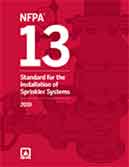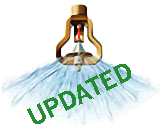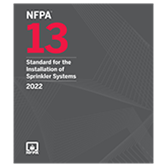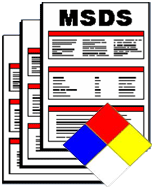The newest edition of NFPA 13 will be adopted as early as 2022. However, the vast majority of states and jurisdictions will be adopting the new standard in January of 2023 with California being one of these states. In this article we will be focusing on the latest changes to the storage chapters and as they compare to the 2019 Edition of this standard. Read more…
 NFPA’s Fire Protection Research Foundation published a report on large-scale fire tests performed at FM Global for rack storage of Group A Plastics under sloped ceilings with slopes steeper than 2 in 12. An excerpt of this report is presented summarizing the results from these suppression tests on ESFR sprinklers with a K-Factor of 16.8. General guidance for sprinkler design is provided by the authors. Read more…
NFPA’s Fire Protection Research Foundation published a report on large-scale fire tests performed at FM Global for rack storage of Group A Plastics under sloped ceilings with slopes steeper than 2 in 12. An excerpt of this report is presented summarizing the results from these suppression tests on ESFR sprinklers with a K-Factor of 16.8. General guidance for sprinkler design is provided by the authors. Read more…
 On November 13th in Carlsbad, CA, KnA will present a seminar on requirements contained in Chapter 32, High-Piled Combustible Storage of the 2019 Edition of the California Fire Code (CFC). We will discuss existing and new fire codes of the CFC and their references to NFPA 13 2016 (NFPA 13 2019). Read more…
On November 13th in Carlsbad, CA, KnA will present a seminar on requirements contained in Chapter 32, High-Piled Combustible Storage of the 2019 Edition of the California Fire Code (CFC). We will discuss existing and new fire codes of the CFC and their references to NFPA 13 2016 (NFPA 13 2019). Read more…
 NFPA 13 2019 provided a ‘roadmap’ included in the back of the standard for 2019 section cross references for many of the sections found in the 2016 Edition. While this ‘roadmap’ table is useful, it is not a complete reference by any means and as a result, users quite often are left wondering ‘where it all went’. We decided to offer a search engine that simplifies the search process. Read more…
NFPA 13 2019 provided a ‘roadmap’ included in the back of the standard for 2019 section cross references for many of the sections found in the 2016 Edition. While this ‘roadmap’ table is useful, it is not a complete reference by any means and as a result, users quite often are left wondering ‘where it all went’. We decided to offer a search engine that simplifies the search process. Read more…
 On October 4th in San Diego, CA, K&A will present a course on basic requirements contained in Chapter 32, High-Piled Combustible Storage of the International Fire Code (IFC) and NFPA 13 2019 Edition. Smoke and heat vents in context of sprinkler protection will be reviewed along with aisle and maximum storage dimension requirements. Discussions also include IFC requirements for protecting storage and their effect on sprinkler system specification. Read more…
On October 4th in San Diego, CA, K&A will present a course on basic requirements contained in Chapter 32, High-Piled Combustible Storage of the International Fire Code (IFC) and NFPA 13 2019 Edition. Smoke and heat vents in context of sprinkler protection will be reviewed along with aisle and maximum storage dimension requirements. Discussions also include IFC requirements for protecting storage and their effect on sprinkler system specification. Read more…
 The new layout of NFPA 13 may be beneficial for new users of the standard, but it can also create confusion and dismay for experienced users as they will have to search and relocate familiar regulations and determine how these new, sometimes reworded and reformatted sections, tables, and paragraphs relate to each other. This is especially true when looking at the new in-rack Chapter 25 of NFPA 13. After using the new standard for some time now, and Chapter 25 in particular, which left me wondering on more than one occasion, I feel a need to share my experiences and observations concerning this steep learning curve. Here is a summary of my conclusions on the reformat. Read more…
The new layout of NFPA 13 may be beneficial for new users of the standard, but it can also create confusion and dismay for experienced users as they will have to search and relocate familiar regulations and determine how these new, sometimes reworded and reformatted sections, tables, and paragraphs relate to each other. This is especially true when looking at the new in-rack Chapter 25 of NFPA 13. After using the new standard for some time now, and Chapter 25 in particular, which left me wondering on more than one occasion, I feel a need to share my experiences and observations concerning this steep learning curve. Here is a summary of my conclusions on the reformat. Read more…
 Based on the recent successful fire test of 50-ft rack storage in single and double row racks with cartoned unexpanded Group A Plastics (and encapsulated/ unencapsulated Class I–IV commodities), FM Global approved a new type of ESFR sprinkler for high-challenge storage applications, the ESFR K-28. It is approved as a ceiling-only, quick-response, wet-pipe, pendent storage sprinkler. Read more…
Based on the recent successful fire test of 50-ft rack storage in single and double row racks with cartoned unexpanded Group A Plastics (and encapsulated/ unencapsulated Class I–IV commodities), FM Global approved a new type of ESFR sprinkler for high-challenge storage applications, the ESFR K-28. It is approved as a ceiling-only, quick-response, wet-pipe, pendent storage sprinkler. Read more…
 The newest edition of NFPA 13 (2019 Edition) will be adopted as early as 2019. However, the vast majority of states and jurisdictions will be adopting the new standard in January of 2020. In this article we will be focusing on the reformat and new layout of the standard and discussing changes for this latest edition of NFPA 13 in the application and use of ESFR (Early Suppression, Fast Response) sprinkler systems. Read more…
The newest edition of NFPA 13 (2019 Edition) will be adopted as early as 2019. However, the vast majority of states and jurisdictions will be adopting the new standard in January of 2020. In this article we will be focusing on the reformat and new layout of the standard and discussing changes for this latest edition of NFPA 13 in the application and use of ESFR (Early Suppression, Fast Response) sprinkler systems. Read more…
 Explore with us in this article the do’s and don’ts of using ESFR sprinkler systems. We discuss common pitfalls in applying these types of sprinkler systems and provide detailed explanations on their correct usage including applicable codes and regulations. Presented are the latest updates on this subject matter based on the 2013 and 2016 editions of NFPA 13, FM Global Property Loss Prevention Data Sheets, and relevant results from the latest fire tests with ESFR sprinkler systems. Read more…
Explore with us in this article the do’s and don’ts of using ESFR sprinkler systems. We discuss common pitfalls in applying these types of sprinkler systems and provide detailed explanations on their correct usage including applicable codes and regulations. Presented are the latest updates on this subject matter based on the 2013 and 2016 editions of NFPA 13, FM Global Property Loss Prevention Data Sheets, and relevant results from the latest fire tests with ESFR sprinkler systems. Read more…
 Klausbruckner & Associates is announcing a new seminar for November 9th 2016. This seminar will provide a detailed overview of the latest fire and building code provisions associated with flammable and combustible liquids in containers and portable tanks. Discussed will be code changes from the 2013 to the 2016 Edition of the California Fire Code (CFC). Read more…
Klausbruckner & Associates is announcing a new seminar for November 9th 2016. This seminar will provide a detailed overview of the latest fire and building code provisions associated with flammable and combustible liquids in containers and portable tanks. Discussed will be code changes from the 2013 to the 2016 Edition of the California Fire Code (CFC). Read more…












